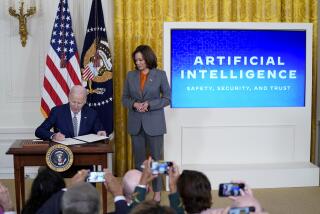Premises, Logic Flawed in Tort Reform Column
- Share via
Michael Schrage’s “Tort Reform? It’s Government Interference in Marketplace” (March 9) is utterly ridiculous, shot full of false premises and false logic. Calling lawyers a knowledge industry who exploit the willingness of uninformed juries to reach into anything that looks like a deep pocket to heap largess on some “poor, defenseless” individual or class of individuals is itself ludicrous.
Today there exists no test for reasonableness for such lawsuits. This produces an enormous incentive for such lawyers to feather their own nests by exploiting ignorance. The $4-billion judgment against companies supplying breast implants is an excellent case in point. A comprehensive and conclusive study that shows breast implants do not cause the problems asserted in the lawsuit should have prompted the judge to throw out the lawsuit. Such lawyers are parasites, not part of a knowledge industry. There can be no rational comparison with actual knowledge industries such as software designers, aerospace engineers and molecular biologists.
The one legitimate purpose of government is protection of property. This includes the protection of large corporations from exploitative individuals as well as the protection of individuals from large corporations.
The present system finds lawyers advertising for potential cases, bragging on how much they have gotten their customers. The easy attack also produces incentives for companies to settle in order to minimize the cost instead of fighting the cases. Therefore, in very many cases, actual fault is never established. This cannot be called a knowledge industry when it is in fact exploitative and parasitic.
Instead of other countries copying our tort system, most Western countries already require the loser to pay all costs. This is certainly a valid screening test of legitimacy. Most other Western countries also have a system that does not allow astronomical rewards to lawyers. Faced with having to prove culpability or work for nothing, lawyers will get real with forensic analysis and take only legitimate cases.
Schrage also shows that he doesn’t know the difference between a subsidy and limiting the incentive for egregious exploitation. Very many cases of damage claim are frivolous, such as the hot-coffee case in which a jury awarded a claim against McDonald’s. The judge should have thrown this one out too. Anyone can misuse a product and cause themselves harm. There is almost no end to such possibilities. Yet juries regularly reward lawyers and their customers out of both sympathy and ignorance.
Limiting this parasitic rape of producers of our products is long overdue. As it is, it drives up the cost of products and tends to eliminate the availability of other needed products.
ROBERT J. CALVERT
Palos Verdes Estates
More to Read
Inside the business of entertainment
The Wide Shot brings you news, analysis and insights on everything from streaming wars to production — and what it all means for the future.
You may occasionally receive promotional content from the Los Angeles Times.










